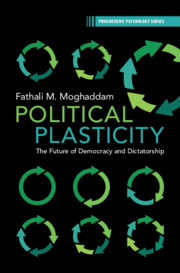Book contents
- Political Plasticity
- The Progressive Psychology Book Series
- Political Plasticity
- Copyright page
- Dedication
- Contents
- Figures
- Preface
- Acknowledgments
- Chapter 1 Political Plasticity, the Key to Understanding the Future of Democracy and Dictatorship
- Chapter 2 Hardwiring inside and outside People
- Part I Political Plasticity and Behavioral Continuity
- Part II Change Agents, in Theory and Practice
- Chapter 8 Revolutions and Political Plasticity
- Chapter 9 War as Transformative
- Chapter 10 Technology Forces Change
- Chapter 11 Globalization and Deglobalization
- Part III Looking Ahead
- Notes
- References
- Index
Chapter 9 - War as Transformative
from Part II - Change Agents, in Theory and Practice
Published online by Cambridge University Press: 15 January 2023
- Political Plasticity
- The Progressive Psychology Book Series
- Political Plasticity
- Copyright page
- Dedication
- Contents
- Figures
- Preface
- Acknowledgments
- Chapter 1 Political Plasticity, the Key to Understanding the Future of Democracy and Dictatorship
- Chapter 2 Hardwiring inside and outside People
- Part I Political Plasticity and Behavioral Continuity
- Part II Change Agents, in Theory and Practice
- Chapter 8 Revolutions and Political Plasticity
- Chapter 9 War as Transformative
- Chapter 10 Technology Forces Change
- Chapter 11 Globalization and Deglobalization
- Part III Looking Ahead
- Notes
- References
- Index
Summary
Societies are transformed by total wars, which mobilize entire populations, penetrate society as a whole, and involve both civilian and military populations as direct targets of aggression, as well as resources for inflicting harm and destroying the enemy. Total wars bring about enormous (forced) movement of populations, as well as changes in gender roles and social class relations. Because most men are directly involved on the front lines of the war effort, new opportunities are created for women to become active in areas from which they were previously excluded. Also, because of the enormous sacrifices made by the general population and the real possibility of national defeat at the hands of the enemy, the rich also become more ready to make some sacrifices. During total wars, the rich–poor divide becomes smaller, as the rich make larger contributions toward the war effort. However, as discussed in this chapter, evidence suggests that this increase in political plasticity is only temporary. The rich–poor divide has increased enormously since World War II.
Keywords
- Type
- Chapter
- Information
- Political PlasticityThe Future of Democracy and Dictatorship, pp. 101 - 114Publisher: Cambridge University PressPrint publication year: 2023

